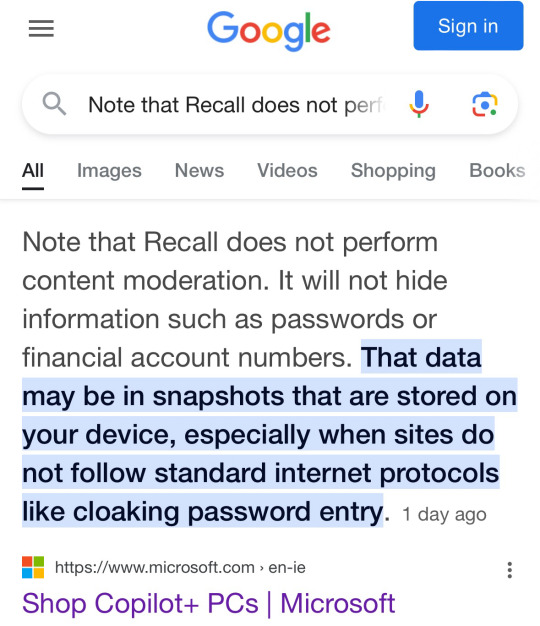#group policy editor
Explore tagged Tumblr posts
Text
you can also use Group Policy Editor to turn it off. access the Local Group Policy Editor by typing gpedit.msc in the command prompt, then press Enter
go to User Configuration > Administrative Templates > Windows Components > Windows Copilot. in the right pane, double-click "Turn off Windows Copilot" to Enable the setting (which turns off the AI spyware)
Literal definition of spyware:

Also From Microsoft’s own FAQ: "Note that Recall does not perform content moderation. It will not hide information such as passwords or financial account numbers. 🤡

251K notes
·
View notes
Text
I am attempting to disable windows 11 on my new laptop and.
Lord. Oh dear lord the tech issues
#Following a simple guide and#Stuff is Not Working#No group policy editor#Can't enable or activate on via run admin#I am loosing my snol mind
4 notes
·
View notes
Text
it is so incredibly irritating that in the year of our lord 2023 microsoft still doesn't provide native way to toggle windows key functionality
u have group policy edits which require a restart, or editing ur registry (which can be dicey and also requires a restart).
then there's third party software but that either also edits your registry, or entails something like autohotkey, which some online games consider cheating software and may even take steps to try to detect if it's running on your system lmao.
tears out hair
#personal#i may end up doing group policy editor but i'm still fucking annoyed because i want to be able to toggle it on and off as needed#i used to have a programmable logitech keyboard that had a toggle option for it but i no longer have that keyboard bc it was a piece of jun#i hate u microsoft
2 notes
·
View notes
Text
The Trump administration accidentally included the conservative editor of The Atlantic in a group chat where they were discussing, in great detail, the US bombing campaign in Yemen
In all, 18 individuals were listed as members of this group, including various National Security Council officials; Steve Witkoff, President Trump’s Middle East and Ukraine negotiator; Susie Wiles, the White House chief of staff; and someone identified only as “S M,” which I took to stand for Stephen Miller. I appeared on my own screen only as “JG.”
...I had very strong doubts that this text group was real, because I could not believe that the national-security leadership of the United States would communicate on Signal about imminent war plans. I also could not believe that the national security adviser to the president would be so reckless as to include the editor in chief of The Atlantic in such discussions with senior U.S. officials, up to and including the vice president...
At this point, a fascinating policy discussion commenced. The account labeled “JD Vance” responded at 8:16: “Team, I am out for the day doing an economic event in Michigan. But I think we are making a mistake.” (Vance was indeed in Michigan that day.) The Vance account goes on to state, “3 percent of US trade runs through the suez. 40 percent of European trade does. There is a real risk that the public doesn’t understand this or why it’s necessary. The strongest reason to do this is, as POTUS said, to send a message.”
The Vance account then goes on to make a noteworthy statement, considering that the vice president has not deviated publicly from Trump’s position on virtually any issue. “I am not sure the president is aware how inconsistent this is with his message on Europe right now. There’s a further risk that we see a moderate to severe spike in oil prices. I am willing to support the consensus of the team and keep these concerns to myself. But there is a strong argument for delaying this a month, doing the messaging work on why this matters, seeing where the economy is, etc.”...
At 8:27, a message arrived from the “Pete Hegseth” account. “VP: I understand your concerns – and fully support you raising w/ POTUS. Important considerations, most of which are tough to know how they play out (economy, Ukraine peace, Gaza, etc). I think messaging is going to be tough no matter what – nobody knows who the Houthis are – which is why we would need to stay focused on: 1) Biden failed & 2) Iran funded.”
The Hegseth message goes on to state, “Waiting a few weeks or a month does not fundamentally change the calculus. 2 immediate risks on waiting: 1) this leaks, and we look indecisive; 2) Israel takes an action first – or Gaza cease fire falls apart – and we don’t get to start this on our own terms. We can manage both. We are prepared to execute, and if I had final go or no go vote, I believe we should. This [is] not about the Houthis. I see it as two things: 1) Restoring Freedom of Navigation, a core national interest; and 2) Reestablish deterrence, which Biden cratered. But, we can easily pause. And if we do, I will do all we can to enforce 100% OPSEC”—operations security. “I welcome other thoughts.”...
The account identified as “JD Vance” addressed a message at 8:45 to @Pete Hegseth: “if you think we should do it let’s go. I just hate bailing Europe out again.” (The administration has argued that America’s European allies benefit economically from the U.S. Navy’s protection of international shipping lanes.)
It was the next morning, Saturday, March 15, when this story became truly bizarre.
At 11:44 a.m., the account labeled “Pete Hegseth” posted in Signal a “TEAM UPDATE.” I will not quote from this update, or from certain other subsequent texts. The information contained in them, if they had been read by an adversary of the United States, could conceivably have been used to harm American military and intelligence personnel, particularly in the broader Middle East, Central Command’s area of responsibility. What I will say, in order to illustrate the shocking recklessness of this Signal conversation, is that the Hegseth post contained operational details of forthcoming strikes on Yemen, including information about targets, weapons the U.S. would be deploying, and attack sequencing.
The only person to reply to the update from Hegseth was the person identified as the vice president. “I will say a prayer for victory,” Vance wrote. (Two other users subsequently added prayer emoji.)
According to the lengthy Hegseth text, the first detonations in Yemen would be felt two hours hence, at 1:45 p.m. eastern time. So I waited in my car in a supermarket parking lot. If this Signal chat was real, I reasoned, Houthi targets would soon be bombed. At about 1:55, I checked X and searched Yemen. Explosions were then being heard across Sanaa, the capital city.
5K notes
·
View notes
Text
Geek Uninstaller works great to remove garbage you don't want on your PC: X
Group Policy Editor (gpedit.msc) is your best tool for configuring how every aspect of your machine works, but it's no longer included in Home Editions of Windows, so you'll need to download it from a reputable source (I've been able to find safe distributions regularly, but don't want to link just in case - always do your research before downloading anything)
you'll probably have to reinstall Group Policy Editor and remove some programs over and over after major updates, but at least these two give you control over your computer
for my phone, I needed to download management software onto my PC to uninstall garbage and spyware from my phone, and it can be scary deleting apps whose names you don't recognize, but at least the one I use asks "You sure about that?" for system programs, and you can look up the file names to make sure your device will keep working after uninstall
I don't know about Apple devices, but I'm sure white-hats have developed ways to help you out if that's your thing
the fact that we need to go to these lengths just to use our tech without worrying about surveillance and data theft is pure enshittification, and I wish we could all just ditch these enshittified OSes and switch to Linux, but if so few people feel confident about using these personal-control programs and snap-ins, Linux is an unrealistically large leap
Initially planned for release in June, the launch of Recall was delayed to address these security concerns. Microsoft now plans to roll out the feature to Windows Insiders testers in October.
Remember that new Windows 11 privacy-violating feature that freaked everyone out a few months ago? The screen-recording gizmo that watches everything you do, including logins with passwords, then records those screens to a database? Then uses "AI" to interpret what it's recorded, so you somebody can search it?
Everyone thought Microsoft had heard the backlash and cancelled the project. Nope.
It's baaaaaaaack... and coming to a Windows 11 PC near you next month, October 2024.
#windows 11#windows recall#windows copilot#privacy#surveillance#group policy editor#artificial intelligence
2K notes
·
View notes
Note
Heya, did you figure out ReVanced patching on PC already? It's indeed possible although a bit more complex
Afraid I haven't had a chance to look into it yet (uni's been keeping me very busy) but other than Firefox's ram management issues and not being able to turn off autoplay, I'm probably better off sticking with PWA, since I can achieve the ad-free and remove unwanted elements with ublock origin and being able to use shinigami eyes on mobile is very nice. Hopefully someday someone will port xkit over to mobile Firefox and I'll be good (although if it's on revanced I'll absolutely reconsider! :) ).
In youtube's case newpipe isn't very stable, but if I get fed up with it I'll probably switch to piped (includes sponsorblock). But I'm absolutely still willing to give revanced a shot if it doesn't also rely on android 8 things like the patcher does (I'm stuck on 7 for the foreseeable future and seemingly everything cuts its support below 8 or it does run but assumes you have 6+ gigs of ram to throw at it :/ ).
How complex are we talking though? On a scale of using a command line to downloading an entire development studio and compiling and eventually debugging someone else's code.
#You've got mail!#Realistically it can't be harder than wrangling ms word version roll-back on a home copy of windows right?#(home doesn't support the group policy editor or their official tool. After 3 hours I got around it)
0 notes
Text
btw if you recently updated your windows computer and got the AI assistant Copilot against your will you can completely disable it thru the Group Policy Editor or Registry editor, rather than just hiding it in the taskbar settings
#windows#microsoft#immediately looked up how to do that shit bc fuck that#if you have the windows home edition like me you use registry editor otherwise you can use the group policy editor
0 notes
Text
I'm so fucking tired of Windows' built-in adware.
#blog#windows 11#i tried the group policy editor thing. it didn't work#i'm becoming more and more tempted to go back to ubuntu
1 note
·
View note
Text
New Development in the Helicopter Crash 👇

This gets more interesting 👇

Her social media has been scrubbed 👇

A White House aide for Biden 👇

Graduated with a Biology degree in 2019 from North Carolina Chapel Hill... Where the gain of function that created Covid started.
Let's löök at her parents 👇

REBECCA LOBACH was the DAUGHTER of DAVID LOBACH (Duke University Medicine; Elimu Informatics; HHS) and ELIZABETH LOBACH (New Regency).
DAVID FRANKLIN LOBACH
*DUKE UNIVERSITY SCHOOL OF MEDICINE, Chief of Division Clinical Informatics, Associate Consulting Professor
*DUKE FAMILY MEDICINE PROGRAM, Endocrinology Consultant
*ELIMU INFORMATICS, VP of Health Informatics
*CDSiC PROJECT, Elimu Informatics (Co-Investigator)
💥NOTE 1: Duke University is run by Trustees Chairman and Mossad asset, Laurene Sperling, who is also the Chairman of Combined Jewish Philanthropies (CJP) and is married to Thermo Fisher (PCR TESTS) Lead Director, Scott Sperling. Thermo Fisher = Temasek (Singapore).
💥NOTE 2: Duke University School of Medicine is led by Dean, Nancy Andrews, who is the Chairman of Wellcome Burroughs (Wellcome/Farrar), who sits on the Board of Directors at Novartis and is a Senior Advisor to NIH Executive Leadership (Anthony Fauci).
💥NOTE 3: Duke Kunshan is a PARTNERSHIP between Duke University and Wuhan University and it officially opened its doors in 2013, which is the SAME YEAR that DAVID RUBENSTEIN (Duke Capital Partners, Carlyle Group, Booz Allen Hamilton, CFR, Brookings, etc.) became the CHAIRMAN of the DUKE UNIVERSITY BOARD OF TRUSTEES.
*Both David Rubenstein and Laurene Sperling are CURRENTLY on the ADVISORY BOARD of DUKE KUNSHAN UNIVERSITY in WUHAN, CHINA.
Duke University is arguably the MOST IMPLICATED SCHOOL IN AMERICA with regard to the COVID PANDEMIC CONSPIRACY and the CREATION & RELEASE of COVID… and COVERUP of COVID’S ORIGINS.
Her Mother 👇
ELIZABETH LEE LOBACH
NEW REGENCY PRODUCTIONS (Development), Writers’ Assistant, Office Assistant, Analyst & Script Editor
*TWENTIETH CENTURY FOX (Post-Production), Office Assistant, Research & Analysis.
💥NOTE: New Regency Productions was FOUNDED by ISRAELI SPY, ARNON MILCHAN, one of NETANYAHU’S CLOSEST OPERATIVES and ISRAEL’S MOST LEGENDARY SPIES. He was involved in helping ISRAEL STEAL AMERICAN NUCLEAR SECRETS several decades ago.
Moving on 👇

This is the man that founded the company where helicopter pilot, Rebecca Lobach’s mother works…
Nothing to see here 👇


Rebecca Lobach was still in ROTC training in 2018.
How is she flying government continuity missions in a Blackhawk in Washington DC 6 years later as a captain? And how did she afford a $520,000 house two years into the military? 👇
Rebecca Lobach, involved in DCA crash, served as a White House social aide under Biden.
She escorted Ralph Lauren through the White House when he was among those awarded the Presidential Medal of Freedom by former fake President Joe Biden. 👇

This is a screen grab from the FAA’s Airman registry which is available to the public it shows that Rebecca Marie Lobach did not currently hold an FAA medical which is required to have military certificates converted over to FAA certificates meaning she lost her medical…? 👇

Not sure what she ‘destroyed’.. but she doesn’t look fit to me! 👇
A statement from:
Art Halvorson @ArtHalv....
As a former military instructor, I'll tell you that Rebecca Lobach in NO WAY should have been the pilot in command on that flight.
500 hours in 5 years is Inconceivable! 👇
I think there’s more to this tragic incident than DEI hiring, but it was because of DEI policies that Rebecca was on board that helicopter and there are now 67 people dead. 🤔
#pay attention#educate yourselves#educate yourself#reeducate yourselves#knowledge is power#reeducate yourself#think about it#think for yourselves#think for yourself#do your homework#do your research#do your own research#do some research#ask yourself questions#question everything#helicopter crash#news#rabbit hole#you can't make this shit up#government corruption#government secrets#investigation
274 notes
·
View notes
Text
The nonprofit group that runs Wikipedia was threatened by Ed Martin, the interim United States Attorney for the District of Columbia, in a letter accusing it of “allowing foreign actors to manipulate information and spread propaganda to the American public.”
“Wikipedia is permitting information manipulation on its platform, including the rewriting of key, historical events and biographical information of current and previous American leaders, as well as other matters implicating the national security and the interests of the United States,” Martin wrote in a letter dated Thursday that was first reported by The Free Press.
The letter accuses the Wikimedia Foundation, the organization behind the online encyclopedia, of violating a tax code that requires nonprofits to operate exclusively for “religious, charitable, scientific, testing for public safety, literary, or educational purposes.”
Investigations into the tax-exempt statuses of nonprofits are usually handled by the Internal Revenue Service, not criminal prosecutors, The Free Press noted, citing the IRS complaint process.
Martin said in the letter that his office received information that Wikipedia’s “information management policies” have benefited “foreign powers.” He claimed that Wikipedia subverts “the interests of American taxpayers” due to its board being made up “primarily of foreign nationals.”
“Masking propaganda that influences public opinion under the guise of providing informational material is antithetical to Wikimedia’s ‘educational’ mission,” Martin wrote.
Wikipedia editor Molly White told the Washington Post that Martin’s letter is another way Trump and his allies are “weaponizing laws to try to silence high-quality independent information.”
148 notes
·
View notes
Text
The Fandom Fallout wiki is still dominated by white supremacists and child abusers. It is a textbook high-control group. Nukapedia is a racist institution of abuse. It is not safe. Any marginalized person who joins that community will be bullied into defending the alt-right power structure, or they will be hatestalked, silenced, and defamed. They will warp reality to paint you as a monster and then dehumanize you. They will follow you offsite and anonymously harass you. They ignore all proof that does not serve alt-right domination.
They dehumanize anyone who calls out their racism, 'because it's unjustifiable to call us racist,' but they obsessively police people of color for making white people uncomfortable, and incessantly call them "racist against white people" or even "reverse racist." They say 'there is no discrimination at NP' because 'the trolls who were prejudiced against white people were already banned.'
They overwhelmingly favor alt-right users who have never contributed over progressive wiki contributors. Many influential in-group voices have never edited the wiki at all.
They punish anyone who calls another user alt-right, but they also explicitly allow alt-right rhetoric in the current linked server. Talk of addressing the alt-right problem prompts the in-group to start identifying "alt-left" users to punish. Any discussion pertaining to their abuses or biases will be immediately perverted into something they can use to further harm their victims and consolidate their power.
They lie and spread hate speech to provoke reactions and then use those reactions as an excuse to dehumanize people. They pretend "policy" forces them to abuse the people they target. Alt-right-adjacent users are immune to being banned at Nukapedia; any ban against an alt-right user will always be overturned by the head admin, even for non-contributing malicious vandals, and the banning staffer will be severely punished if they challenge the decision.
I cannot stress enough that over the past year they have purged nearly every person of color and queer person from the community. They are brutally unfair to marginalized editors, and they dehumanize and hunt them after they leave. They continue to harm and provoke them with lies under the pretense of "enforcing policy".
Their leadership abusively deny reality to protect eachother and harm their targets. They spread nazi propaganda. They harm children for fun. They engage in the degradation of women they hate, up to and including sexual degradation.
The community has died. The remaining members openly lament the sudden lack of activity. They have enabled anonymous editing because they crucified or scared off nearly every editor.
In 2023, Fallout IP personnel used to engage with Nukapedia. Now, nobody of repute involves themselves with Nukapedia, because it is a hate community.
They punish people who tell the truth. They will force you to affirm their lies to earn basic respect. They will harass and bully you if you refuse to validate their abuses, and when you push back, they will call you a bully, ban you, shit on your name for months and months, and send you anon hate offsite if possible.
The recent death of my cat was the most traumatic event of my life. They messaged me saying I deserved it.
In response to my posting this they will tell lies about me and argue that the admins need more power. They obsessively watch me and treat my acknowledgement of reality as persecution. They compare me to a demon and dehumanize anyone who admits they speak to me. Nukastaff have discussed suing me with the explicit goal of financial harassment. They want to intimidate me into silence so they can keep abusing people unchallenged.
198 notes
·
View notes
Text
Brandi Buchman at HuffPost:
A public watchdog group sued Defense Secretary Pete Hegseth and a slew of other Trump administration officials Tuesday after a journalist revealed he was inadvertently added to a text chain discussing U.S. war plans. The lawsuit, brought by the watchdog group American Oversight and first reported by HuffPost, requests that a federal judge formally declare that Hegseth and other officials on the chat violated their duty to uphold laws around the preservation of official communications. Those laws are outlined in the Federal Records Act and, according to lawyers for American Oversight, if agency heads refuse to recover or protect their communications, the national archivist should ask the attorney general to step in. On Monday, The Atlantic’s editor-in-chief Jeffrey Goldberg reported that national security adviser Michael Waltz inadvertently added him to a Signal group chat with more than a dozen Trump administration officials and aides including Vice President JD Vance, Defense Secretary Pete Hegseth, Secretary of State Marco Rubio, homeland security adviser Stephen Miller and Treasury Secretary Scott Bessent. CIA Director John Ratcliffe told members of the Senate Intelligence Committee on Tuesday that he was also in the Signal chat. Director of National Intelligence Tulsi Gabbard would not admit whether she was a participant, though Goldberg reported she was; instead, she said the matter was “still under review.” As American Oversight lawyers pointed out in their lawsuit Tuesday, Rubio is also the acting archivist of the United States and, as such, “is aware of the violations” that allegedly occurred. He is also “responsible for initiating an investigation through the Attorney General for the recovery of records or other redress,” the lawsuit said. Goldberg’s article only shared a portion of the messages he received over two days. Most of the texts were “procedural” and “policy” talk, he wrote, but that changed on March 15.
Good to see that scumbag Pete Hegseth got sued for his role in the Signal chat leaks. DUI Hire Hegseth must go!
132 notes
·
View notes
Text
Across the US, people speaking out on behalf of Palestinian human rights and against Israeli war crimes, apartheid policies, and settler-colonial expansion that have been unfolding over nearly eight decades are facing a wave of McCarthyite backlash directly targeting their future careers and livelihoods. Students at other prominent universities have faced the same: the leaders of Harvard University student groups were doxxed and smeared for signing a statement also expressing solidarity with the Palestinian people. Their names and faces were plastered on a mobile billboard truck that roamed around campus for days, and a “College Terror List” circulated online accusing them of antisemitism. Several also lost job offers. A Berkeley law professor published an op-ed in the Wall Street Journal imploring legal employers not to hire his own students and smearing them as antisemitic. [This piece was originally commissioned by an editor at The Guardian, who asked me to write about the wave of retaliation and censorship of political expression in solidarity with Palestinians that we’ve seen in the past two weeks. Amid my work as an attorney on some of the resulting cases, I carved out some time to write the following. Minutes before it was supposed to be published, the head of the opinion desk wrote me an email that they were unable to run the piece. When I called her for an explanation she had none, and blamed an unnamed higher-up. That a piece on censorship would get killed in this way—without explanation, but plainly in the interest of political suppression—is, beyond the irony of the matter, a grave indictment of the media response to this critical moment in history.]
2K notes
·
View notes
Text
I'm convinced that Ireland's recent petition to the ICJ to expand and change the definition of "genocide" was either pre-planned or waiting for something like the Amnesty International report that recently came out. However, the report is problematic. It buries the lede in its executive summary, the first and maybe only part that many people read, that they disagree with the accepted standard for genocide and are expanding it.
This disagreement with the accepted definition and their intention to change it is on pages 101 and 102. A little over 100 pages later they admit to this action, which makes up the basis for their entire argument. There are four whole sections before this, two of which are their scope and methodology section and their background and context section. When making an argument for changing a well defined and established term and expanding its accepted definition you have to introduce the argument early on and work to establish it throughout your document.
Especially if its the crux of your entire position.
By pushing off this admittance until pages 101/102 and not even mentioning it in the executive summary it comes across as Amnesty International knew exactly that their argument was poor.
Surely when they get to it they provide a good argument backed up with sources and citations that they expand upon and explain and support them, right?

Nope.
One court case that they don't even go into in the section. Also, this is it. This is their entire section admitting that they disagree with the accepted definition and legal standard of genocide, that they are expanding it to encapsulate their standards, don't explain what those standards are, and cite one case that maybe supports their position.
One citation to support changing the definition and the legal framework surrounding it 101/102 pages into an almost 300 page document.
Any lawyer could easily get this argument thrown out. Any professor would toss out your paper for this. Journals, editors, publishers...you'd receive scathing critical feedback for this alone.
One citation to support your position to change the accepted definition and standards of a highly impactful and devastating act because you "feel" that it is happening and the standard is too "narrow".
In fact, the report alludes to other experts and literature that supposedly supports their position, but it is not included in this section that stands at the core of their argument. It's almost like finding people who also feel the same way are not actually evidence in the eyes of accepted standards, precedence, and evidence based practices and policy.
It'd be like someone in entomology saying they think spiders are actually insects because they feel that the definition of insects is too narrow, providing one citation, not explaining why that citation supports their position, and ignoring the whole body of literature that states otherwise.
And that's been my problem with the position of a lot of anti-Israel groups and individuals. It has been a subjective position based upon them feeling like this conflict is the worst thing ever and thus must constitute a genocide. There's a reason even the ICJ deemed it not a genocide but a conflict that could potentially become one.
Creating a report that is predicated on changing the definition of "genocide", burying the lede on the intention of doing so, and then (likely) having another country petition to change the definition based upon your report is shady behavior. We would all call it out if it was some Right Wing organization in the USA doing it towards another country, organization, or what have you. But again, Israel and, by extension and affiliation, Jews are held to a different standard than anyone else. That is what makes so many of these organizations and their actions antisemitic. None of this effort to goalpost and change the rules and definitions happens for any other country or people.
Only Israel, Israelis, and Jews.
And we know what happens when that occurs.
#jumblr#antisemitism#leftist antisemitism#intersectional antisemitism#Amnesty International#Amnesty International trying real hard to hide its antisemitism behind a big report and jargon
203 notes
·
View notes
Text
DR Congo Protests Throw a Wrench in the Western-Backed War of Pillage
youtube
On The Freedom Side LIVE, Thursday, 1/30 at 3pm ET/12pm PT, hosts Rania Khalek and Eugene Puryear are joined by special guests:
Kambale Musavuli from the Center for Research on the Congo joins the show to discuss the rapidly escalating conflict in the Democratic Republic of Congo as fighting between the Rwandan backed-M23 rebel group and the Congolese army (FARDC) intensifies in the major city of Goma. Musavuli will discuss the latest updates as well the protests that erupted across the country at US & EU embassies over the West’s complicity in the brutal proxy war for the DR Congo’s vast mineral wealth.
Abubaker Abed, Palestinian journalist and commentator in Gaza, joins the show to discuss Palestinians’ historic return to their devastated homes in the northern Gaza Strip on Monday after over a year of genocidal war. Reporting firsthand, Abed will explain how this historic mass return marks a powerful act of Palestinian resistance and is seen as a significant step toward reclaiming all occupied territories.
Vijay Prashad, Executive Director of the Tricontinental Institute, joins the show to unpack a critical question: As Donald Trump’s return to the White House emboldens far-right movements across the North Atlantic, do these forces actually challenge neoliberalism—or are they merely its latest iteration? Prashad will argue that the far right, despite its populist rhetoric, remains tied to the neoliberal economic and security policies they claim to oppose.
Hala Jaber Leb, award-winning Beirut-based journalist, joins the show to discuss Israel's violation of its ceasefire agreement with Hezbollah. Israel continues to bomb southern Lebanon and refuses to withdraw their forces despite the 60-day ceasefire deadline. Thousands of Lebanese residents have been returning to their homes in the South in defiance of Israel’s occupation.
Doug Henwood, economic journalist and host of the podcast Behind the News, joins the show to discuss how Trump has stacked his administration with crypto entrepreneurs, launched his second cryptocurrency, and pledged to make the US the “crypto capital of the planet.” Henwood will explain the danger of Trump’s actions and the increasing threat of expanded US government involvement in crypto, an industry rife with risks and scams.
Zoe Alexandra, Editor of Peoples Dispatch, joins the show to discuss how Colombian President Gustavo Petro stood up to Trump over the inhumane treatment of Colombian migrants deported from the US. Alexandra will explain the tense diplomatic impasse between Washington and Bogotá and discuss how progressive governments in Latin America are fighting for the respect and dignity of migrants amid the Trump administration’s mass deportation campaign.
107 notes
·
View notes
Text
The President and the Police
It is curious to me that people who are (rightly) outraged at the police being sent against the college protestors and want to reflect that in their voting in the next election are focusing on the office that has zero power over the police, and not the offices that actually control the police. (This is especially aggravating because we've been talking about the police a lot over the last four years, and so if people actually wanted to change things you would think they would have figured out basic things like "who controls the police.")
The President does not and never has controlled the police. Anywhere in the US. Policing is a local matter. The vast majority of law enforcement is done by the city police (employed and governed by the city), county sheriffs and their deputies (employed by the county), and state police (employed and governed by the state). The laws and regulations and policies are made at the local level. So are hiring decisions! If you want to change things--and God knows the police are corrupt and violent and bigoted and awful, and DESPERATELY need to be changed--you can't do it through which presidential candidate you vote for (or don't vote for). You do it by voting for your local elected officials: town mayor and city councilmen (or whatever the exact positions are in your area), your county sheriff, and your state representatives. And then following up by doing things like attending city council meetings and raising the question of police reform--and talking to your neighbors and people in your community and building a coalition of people to work on alternatives to the police and convincing people to try some of them. If you live in a city that has a protest that the cops have been called to, please call your city government and complain. It won't magically change things but it'll be a little bit of pressure in the right direction.
The President does have some control over Federal law enforcement, but that's the FBI, DEA, ICE, and other more specialized groups (like the military police and Fish and Wildlife enforcement officers). And God knows that they could desperately use reform as well! ICE in particular should be abolished. So yeah, your vote for President will affect those organizations. (Trump, of course, loves ICE and wants to expand its powers and reach.)
But if you are rightly concerned by police response to the protests, and want to use your vote to do something about it, you need to be thinking locally.
And good news! Local elections have far fewer people voting in them, so it's actually much easier to affect things at a local level than it is to affect national affairs.
I know this, because I've seen it happen in my community. I am a supporter of an immigrant rights group in my community, and a while back our little local police department hired a guy who had been fired for racism by the biggest city in the region. This is extremely common; most trained and experienced police would much rather work in larger cities which pay better. So a lot of small towns and county sheriff's departments have trouble getting "qualified" people who want to work there, and regularly hire cops who are only willing to move to rural areas because they've been fired for cause and no larger police department will touch them.
But in this specific case, the local immigrant support group was watching, saw he'd been hired, and swung into action. They encouraged their members to call the city council, and go to city council meetings, and write letters to the editor, and after a couple of months of this the city council conceded and got rid of the guy. If you get a group of people together to make a concerted effort, you can make a difference in the policing in your local community.
But the President can't do jack about it. So don't blame him, blame the people who actually hire, train, and write the policies for the police. Who are all local people living in your area!
344 notes
·
View notes